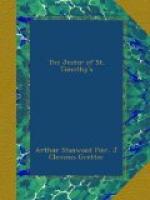“You didn’t have to penalize him unless you wanted to,” said Morrill grimly. “Of course you had a perfect right to do as you pleased, only—” He shrugged his shoulders and walked away, followed by the other Corinthians.
Irving stood stricken. So this was the outcome; in seeking to be sympathetic and to be understood, he had only caused himself somehow to be more hated and despised. Bitterness rose within him, bitterness against Westby, against Morrill, against boys in general, against the school. And only an hour ago, from what he had seen and heard, he had felt that he could like Westby, and had been not without some hope that Westby might some time like him.
He saw Barclay standing with Mr. Randolph by the table on which were the prize cups; Barclay was bending over, arranging them, and the boys were gathering on the opposite side of the track, being “policed back” by the half-dozen members of the athletic committee. Evidently the award of prizes was to be made at once, and either Barclay or Randolph was to hand out the cups—perhaps also to make a speech. But Irving could not wait; he must satisfy himself of his doubts and fears, and so he hurried forward and touched Barclay on the shoulder.
“Just a moment, please,” he said, as Barclay turned. “Did I do anything wrong?”
“You penalized Westby a yard for fouling, I heard; is that so?”
“Yes.”
“Well, you were within your rights. But if it was obviously an unintentional foul, I shouldn’t have been so strict.”
“I misunderstood what you told me,” sighed Irving. “I thought that in case of foul a fellow had to be penalized.”
“Oh, no.” Barclay was busy; he had to think up something to say, by way of a speech, and he turned and began fussing again with the cups.
Irving walked away. Even his friend Barclay was not sympathetic, did not understand the seriousness of what had happened. He could not stay longer to be the target of hostile, vengeful eyes; he felt that half the boys there were blaming him in their hearts for the defeat of their team—and that the others had no gratitude to him for their victory. Not that it would have made him feel any better if they had; he had only wanted and tried to be fair.
He walked away from the field, crossed the track, and passed round into the avenue that led up to the School. When he had gone as far as the bend where from behind the cluster of trees the School buildings became visible, he heard the pleasant ripple of laughter from the crowd. Some one, probably Barclay, was making a speech; to think of being able to stand before boys and make them laugh like that! It seemed to Irving that he had never before known what envy was.




